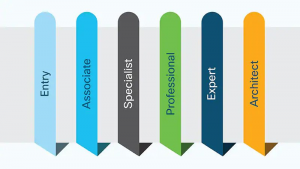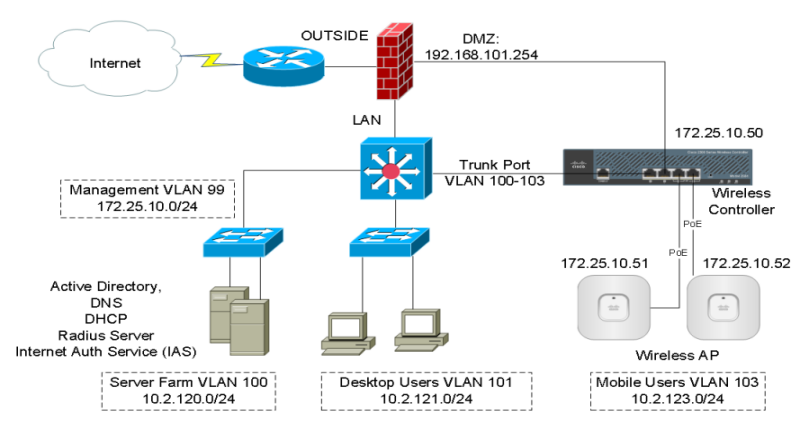About Cisco Certifications: Cisco® Certifications are broadly classified into four groups:
-
- Entry level
- Associate level
- Professional level
- Expert level
Entry Level Certs:
-
-
- CCST Cybersecurity
-
Cisco Certified Support Technician (CCST) Cybersecurity – This exam validates your skills and knowledge of entry-level cybersecurity concepts and topics. These topics include security principles, network and endpoint security, vulnerability assessment and risk management, and incident handling.
It is also a first step toward CyberOps Associate certification.
-
-
- CCST Networking
-
Cisco Certified Support Technician (CCST) Networking – This exam demonstrates that you have the foundational knowledge and skills to show how networks operate, including the devices, media, and protocols that enable network communications.
It is also a first step toward the Cisco Certified Network Associate certification.
Cost: US$125, or redeem Cisco Learning Credits
Duration: 50 minutes
-
-
- CCST IT Support
-
Cisco Certified Support Technician (CCST) IT Support – Available late June 2024
This exam tests your foundational knowledge and skills related to IT support tasks, including queue and time management, documentation, troubleshooting, assisting end users, managing computer components, and identifying security threats.
Cost: TBA
Duration: 50 minutes
Associate Level Certifications
Associate Level Certs: The Associate level of Cisco Certifications begin with CCNA for network configuration & installation, security, operations & troubleshooting or Devnet Associate or CyberOps Associate. Though Cisco says that the Associate Level is the foundation level of networking certification, some certs like Devnet Associate and CyberOps Associate etc. require a lot of theoretical and applied skills to pass the exam.
-
- CyberOps Associate
- Required Exam: 200-901 DEVASC
- CCNA
- Required Exam: 200-301 CCNA
- DevNet Associate
- Required Exam: 200-201 CBROPS
- CyberOps Associate
Topics to study vary according to the specialization. For example, topics covered on the CCNA Exam include
-
-
- 1.0 Network Fundamentals 20%
- 2.0 Network Access 20%
- 3.0 IP Connectivity 25%
- 4.0 IP Services 10%
- 5.0 Security Fundamentals 15%
- 6.0 Automation and Programmability 10%
-
For those interested in knowing the evolution of CCNA, the following chart explores different tracks available in Cisco Certs:

- Entry Level: CCT
- Associate Level:
-
- Devnet Associate
- CCNA
- CyberOps Associate
-
Download practice tests for CCNA Practice Exam.
Professional level certifications: The Professional level is an advanced level of certs that require more expertise in configuration and troubleshooting of enterprise networks. Just like in Associate level, there are different types of Pro level cert to meet varying demands by the Industry:
-
-
- CCNP DevNet Professional
- Required Exams:
Core exam: 350-901 DEVCOR
Concentration exam (choose one):
300-435 ENAUTO, 300-835 CLAUTO, 300-635 DCAUTO,
300-535 SPAUTO, 300-735 SAUTO, 300-910 DEVOPS,
300-915 DEVIOT, 300-920 DEVWBX
- Required Exams:
- CCNP Collaboration
- Required Exams:
Core exam: 350-801 CLCOR
Concentration exam (choose one):
300-810 CLICA, 300-815 CLACCM, 300-820 CLCEI,
300-820 CLCNF, 300-835 CLAUTO
- Required Exams:
- CCNP Data Center
- Required Exams:
Core exam: 350-601 DCCOR
Concentration exam (choose one): 300-610 DCID, 300-615 DCIT,
300-620 DCACI, 300-625 DCSAN, 300-630 DCACIA, 300-635 DCAUTO
- Required Exams:
- CCNP Enterprise:
- CCNP DevNet Professional
-
To achieve CCNP Enterprise, one needs to pass CCNP ENCOR and one of the optionals.
Pass one of the following:
-
-
- 300-410 ENARSI Implementing Cisco Enterprise Advanced Routing and Services (ENARSI)
- 300-415 ENSDWI Implementing Cisco SD-WAN Solutions (ENSDWI)
- 300-420 ENSLD Designing Cisco Enterprise Networks (ENSLD)
- 300-425 ENWLSD Designing Cisco Enterprise Wireless Networks (ENWLSD)
- 300-430 ENWLSI Implementing Cisco Enterprise Wireless Networks (ENWLSI)
- 300-435 ENAUTO Implementing Automation for Cisco Enterprise Solutions (ENAUI)
- CCNP Security
- CCNP Service Provider
- CCNP Security
- Required Exams:
Core exam: 350-701 SCOR
Concentration exam (choose one): 300-710 SNCF, 300-715 SISE,
300-720 SESA, 300-725 SWSA, 300-730 SVPN, 300-735 SAUTO
- Required Exams:
- CCNP Service Provider
- Required Exams:
Core exam: 350-501 SPCOR
Concentration exam (choose one): 300-510 SPRI, 300-515 SPVI,
300-535 SPAUTO
- Required Exams:
- Cisco Certified CyberOps Professional
- Required Exams:
Core exam: 350-201 CBRCOR
Concentration exam: 300-215 CBRFIR
- Required Exams:
-
Among all the Cisco Professional level certs, CCNP (Enterprise) is the most widely taken certs.
Expert level certifications: The Cisco Certified Internetwork Expert (CCIE) certification is the highest level of networking certification and a CCIE certified candidate is perhaps among the most experienced network engineer and most sought after in the industry. The various flavors of CCIE are as given below:
-
-
- CCIE Collaboration
- CCIE Data Center
- CCIE Enterprise Infrastructure
- CCIE Enterprise Wireless
- CCIE Security
- CCIE Service Provider
- CCIE Wireless
- Devnet Expert
-
There is one more level of cert that Cisco had introduces, CCArc short for Cisco Certified Architect. This is the highest level of certification that one can claim in the Cisco’s certifications armour.
FAQ:
-
-
-
-
- What is the scope of CCNA course?
-
-
-
Disclaimer: SimulationExams.com is not associated or affiliated with Cisco® Systems and CCNA®, DevNet®, CCNP®, CCIE® are the registered trademarks of Cisco Systems® and duly recognized.


